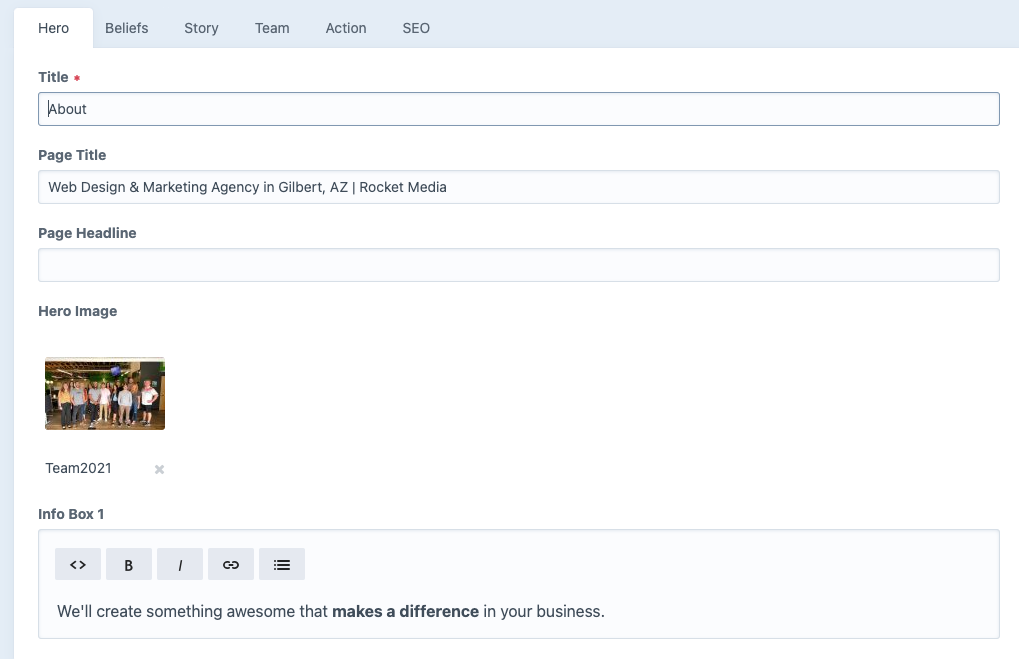Static vs. Dynamic Websites: What Are They and Which Is Better?
on August 12, 2021
Websites come in a variety of shapes and sizes, but one way they can differ is whether they’re static or dynamic.
The difference isn’t obvious when you’re just looking at a website in your browser, but it can heavily impact the functionality of your site—including how easy it is to maintain.
To help you understand the pros and cons, in this blog, we’ll walk you through:
- What is a static website?
- What is a dynamic website?
- What are the benefits of dynamic websites over static?
- Is a static or dynamic website better for me?
Want to build a website? Rocket Media offers tailored website solutions that you fully own yourself.
What is a static website?
A static website consists of a series of HTML files, each one representing a physical page of a website. On static sites, each page is a separate HTML file. When you visit the homepage, you are viewing only the actual homepage file.
Even if two pages contain a chunk of identical content like a footer, the footers exist as two separate versions. So, if you want to update the footer, you must do so on each page.
Static websites are fairly straightforward, and all websites were built this way during the early years of the world wide web.

What is a dynamic website?
A dynamic website uses server technologies (such as PHP) to dynamically build a webpage right when a user visits the page.
After typing in a certain web address, the server will find a bunch of different pieces of information that it then writes into a single cohesive web page. You could compare a dynamic website to a mosaic. That pieced together web page is then what you’ll see as the viewer.
This way of building web pages is considered to be “on the fly” and has several advantages, which we’ll review next.

What are the benefits of dynamic websites over static?
Easier design updates
Since each part of a web page is separate, it is much simpler to update something all at once across many pages.
For example, if you want to make a change to your website’s navigation, you’d only have to change it in one place on a dynamic website. Once you change the file that holds the navigation information, it will then be updated on all pages that contain that file.
Meanwhile, if you had a static website and wanted to update the navigation, you’d have to edit every single page to make any changes. This can be a tedious and repetitive process, prone to human error.
More flexible data
Because a dynamic site pulls together a bunch of page bits to make a whole page, you can store your content and other parts of your site in a database.
The advantage of this is that you can easily access and edit your content in a variety of ways or even have it load across multiple websites. This is great if you have two distinct brands and sites that share some overlapping content.
Databases also make it easy to search your content, categorize it, load it in dynamic ways (such as displaying the 5 most recent blog entries about heat pumps), and back it up. All of this is nearly impossible with a static site.
Easier content updates
Dynamic websites can easily be used in combination with a content management system (CMS) because the various parts of the page are all separate, making it simple for a non-technical person to update content on the site. Anybody implementing content can just create a new page or article without needing to know HTML.
However, with a static site, staff would have to know HTML or employ the help of someone who does in order to create a new web page for a site.
Therefore, your team can simply concentrate on writing and posting unique content and the dynamic site takes care of putting that content into the right spot on the website. And the more unique content your website has, the more likely you are to outrank your competitors in Google search results.
Learn more in our blog, “Local SEO for HVAC Companies: A Beginner’s Guide”.
Is a static or dynamic website better for me?
It really depends on the purpose of the site you’re building.
Dynamic sites may take longer to initially code and develop than static sites and are more expensive to build. If you’re on a tight timeline and budget, you might be better off with a static site.
Overall, static sites might serve you better if your website:
- Is for a limited-time promotion
- Only needs a page or two
- Will be taken down once the promo ends
However, for the vast majority of website projects where you are going to update content frequently, dynamic sites pay off in the end. This is because any initial savings you may achieve from a static website will not offset the additional time and effort you’ll need for future site updates and revisions.
Want to build a dynamic website? Contact Rocket Media.
With 18+ years of experience in digital marketing and web development, Rocket Media can help you find the right web development solution for your business and budget.
From fully customizable websites with total creative freedom to templated sites that look custom at a lower price point, our clients love that they fully own their sites so they never have to worry about buying their website back from us or losing it. We also offer month-to-month contracts because we want to earn your business—every month.
Check out our case studies & work >>

